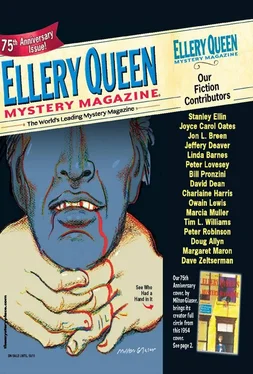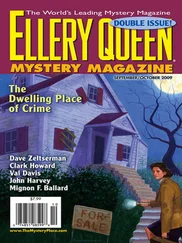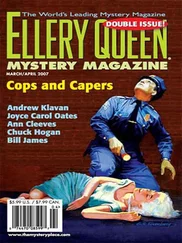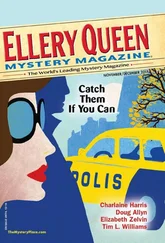Джеффри Дивер - Ellery Queen’s Mystery Magazine. Vol. 148, Nos. 3 & 4. Whole Nos. 900 & 901, September/October 2016
Здесь есть возможность читать онлайн «Джеффри Дивер - Ellery Queen’s Mystery Magazine. Vol. 148, Nos. 3 & 4. Whole Nos. 900 & 901, September/October 2016» весь текст электронной книги совершенно бесплатно (целиком полную версию без сокращений). В некоторых случаях можно слушать аудио, скачать через торрент в формате fb2 и присутствует краткое содержание. Город: New York, Год выпуска: 2016, ISBN: 2016, Издательство: Penny Publications, Жанр: Детектив, на английском языке. Описание произведения, (предисловие) а так же отзывы посетителей доступны на портале библиотеки ЛибКат.
- Название:Ellery Queen’s Mystery Magazine. Vol. 148, Nos. 3 & 4. Whole Nos. 900 & 901, September/October 2016
- Автор:
- Издательство:Penny Publications
- Жанр:
- Год:2016
- Город:New York
- ISBN:0013-6328
- Рейтинг книги:3 / 5. Голосов: 1
-
Избранное:Добавить в избранное
- Отзывы:
-
Ваша оценка:
- 60
- 1
- 2
- 3
- 4
- 5
Ellery Queen’s Mystery Magazine. Vol. 148, Nos. 3 & 4. Whole Nos. 900 & 901, September/October 2016: краткое содержание, описание и аннотация
Предлагаем к чтению аннотацию, описание, краткое содержание или предисловие (зависит от того, что написал сам автор книги «Ellery Queen’s Mystery Magazine. Vol. 148, Nos. 3 & 4. Whole Nos. 900 & 901, September/October 2016»). Если вы не нашли необходимую информацию о книге — напишите в комментариях, мы постараемся отыскать её.
Ellery Queen’s Mystery Magazine. Vol. 148, Nos. 3 & 4. Whole Nos. 900 & 901, September/October 2016 — читать онлайн бесплатно полную книгу (весь текст) целиком
Ниже представлен текст книги, разбитый по страницам. Система сохранения места последней прочитанной страницы, позволяет с удобством читать онлайн бесплатно книгу «Ellery Queen’s Mystery Magazine. Vol. 148, Nos. 3 & 4. Whole Nos. 900 & 901, September/October 2016», без необходимости каждый раз заново искать на чём Вы остановились. Поставьте закладку, и сможете в любой момент перейти на страницу, на которой закончили чтение.
Интервал:
Закладка:
Ellery Queen’s Mystery Magazine. Vol. 148, Nos. 3 & 4. Whole Nos. 900 & 901, September/October 2016
The Crawl Space
by Joyce Carol Oates
Joyce Carol Oates has contributed more than two dozen original stories to EQMM since her fiction first appeared in our pages in October of 1992. It was a crime novel she wrote under the pseudonym Rosamond Smith, published in 1987, and the revelation of the true identity of the writer, that eventually led to EQMM’s invitation to this most celebrated of authors to write for us. For if she’d written a crime novel, we thought, maybe she’d be interested in contributing to EQMM. She was, and her insightful work has been enhancing our fiction content ever since!

Please. You make us uncomfortable.
You are always watching us. Like a ghost haunting us...
Though her husband had died seven years before, the widow still drove past the house in which they’d lived for more than two decades.
Why? — no reason.
(To lacerate a scar, that it might become a raw-throbbing wound again? To lacerate her conscience? Why?)
She was in a new life now. She was no longer in the old life.
He could not know. He had died, his ashes were buried in a proper cemetery. All that was gone. In her new, safe life, in which she lived alone.
Yet: Sometimes she drove past the old house deliberately, and sometimes she found herself driving past without (quite) realizing where she was. Then, it was something of a shock to see — where she was...
Often when she was driving she would instruct herself Maybe no. Not today. And yet when she approached a crucial turn she found herself unable to drive onward as if doing so would be a betrayal of her husband whom she had loved very much.
As he had loved her. Very much.
She felt the same way while driving through the small town in which her husband’s ashes were buried — in a cemetery behind an old red-brick Presbyterian church that dated to the mid-nineteenth century.
She could not not stop at the cemetery. Could not.
Just us two. No one else.
Very much.
Of course, she understood how mistaken this was. No force was compelling her to drive past her former house, or to stop in the little town that was losing population and becoming derelict since an interstate highway bypass opened close by.
Its sad Main Street, with vacant stores. For sale signs. The small cemetery in need of mowing, at this time of year festooned with dandelions gone to seed.
The widow parks at the cemetery, she visits the husband’s grave. It is only my own mind. It is not another’s mind that is making me do these things.
Still, she clears away leaves and other debris from the grave. Sets upright the ceramic pot containing the (artificial) wisteria with its sinewy vines and lavender blossoms she’d brought to the grave, that has been surprisingly durable through winter months. Almost, you would think the blossoms were real...
A small enough gesture from you, my beloved wife. But thank you.
She did not like it: They were watching her.
She was certain. The new owners of the house. For she so often drove past the house.
At more rational times she thought no, of course not. The new owners — (whom she’d met: They were nice-seeming people) — would have to be standing at the front windows of the house and looking out at just the time she drove past. They would have to recognize her car.
Yet, approaching the house she begins to feel her heartbeat quickening. A visceral alertness of the kind you might feel approaching the edge of a great height. Vertigo, it is called. A sensation of dread, and yet yearning. You dare not approach — yet, you are drawn to approach. Almost, you feel an opened hand on the small of your back, gently pushing.
Come here! Come forward.
Yes! You know exactly what to do.
The new owners had assured her, out of sympathy for her widowhood (she’d supposed), that, any time she wished, she could come back to visit the house. They’d been very friendly, very kind-seeming, but she’d never wanted to return to the house in any way that involved them. Though she knew better she could not help but think of them as intruders whom she resented, and whom she knew her husband, who could be unreasonable, would most bitterly resent.
So many years she’d driven this route: returning to the house on Linden Road which was five miles from the small suburban college at which she taught English; turning her car into the asphalt driveway; feeling anticipation as she approached the house, unless it was apprehension — for she never (quite) knew what her husband’s mood would be.
Nearly always, the husband was home. For the husband did consulting work in applied mathematics, working from an office at home.
Not wanting to think Like clockwork for, living our lives, as our bodies live for us, we are not at all clockwork; we do not feel ourselves to be clockwork; each second is new to us, quicksilver and unexpected, undefined.
Unexpected: that day she’d returned home, not from the college but from the medical clinic. With the news that had shaken them both.
Him more than her. For he’d been the one who’d most adamantly not wanted a child.
In his family, mental derangement. (As he called it.) Not mental illness, insanity, or psychosis — nothing that could be clinically diagnosed, or treated. Just — derangement.
She, the wife, a young wife at the time, had not wanted to inquire too closely. She saw the pain in her husband’s handsome thin-cheeked face. She saw that he was distressed, and anxious.
He’d carried himself with a sort of sinewy muscularity, a physical obstinacy that didn’t express his scrupulosity, his fastidiousness. He’d been a perfectionist, and had driven himself very hard in graduate school; from rueful remarks he’d made, she understood that he had come close to a nervous breakdown, or perhaps had actually had a nervous breakdown before he’d met her, and he did not want to risk anything like this again.
What is manliness, masculinity? — she felt sympathy for her husband, for whom imperfection was a kind of shame. She did not like to pry into his personal life, which he called “private.”
Still, she’d thought that, possibly, mental derangement might not be such a risk...
He’d reacted almost violently: No.
No pregnancy. Must terminate. We can’t. Can’t take the chance. What if. No.
But—
No. I’ve told you.
Can’t risk.
Even if the child is — is not — abnormal. Even then—
Our own lives. Must come first.
What we mean to each other.
She’d done as he had instructed. Or rather, as he’d demanded.
Thinking— It is what I want too. Of course.
Emotionally, the husband was the center of her life. Her professional career was not very challenging to her: She had no wish to compete strenuously, and to excel; she was highly competent, reliable and well liked. At her small suburban college it was not difficult to be promoted to the highest professorial rank and to decline (when, more than once, it was offered to her) advancement into administration. Her salary was not high but it supplemented her husband’s salary to a degree that made them financially secure.
We can afford a child. Children.
She did not say. Did not risk.
Читать дальшеИнтервал:
Закладка:
Похожие книги на «Ellery Queen’s Mystery Magazine. Vol. 148, Nos. 3 & 4. Whole Nos. 900 & 901, September/October 2016»
Представляем Вашему вниманию похожие книги на «Ellery Queen’s Mystery Magazine. Vol. 148, Nos. 3 & 4. Whole Nos. 900 & 901, September/October 2016» списком для выбора. Мы отобрали схожую по названию и смыслу литературу в надежде предоставить читателям больше вариантов отыскать новые, интересные, ещё непрочитанные произведения.
Обсуждение, отзывы о книге «Ellery Queen’s Mystery Magazine. Vol. 148, Nos. 3 & 4. Whole Nos. 900 & 901, September/October 2016» и просто собственные мнения читателей. Оставьте ваши комментарии, напишите, что Вы думаете о произведении, его смысле или главных героях. Укажите что конкретно понравилось, а что нет, и почему Вы так считаете.












